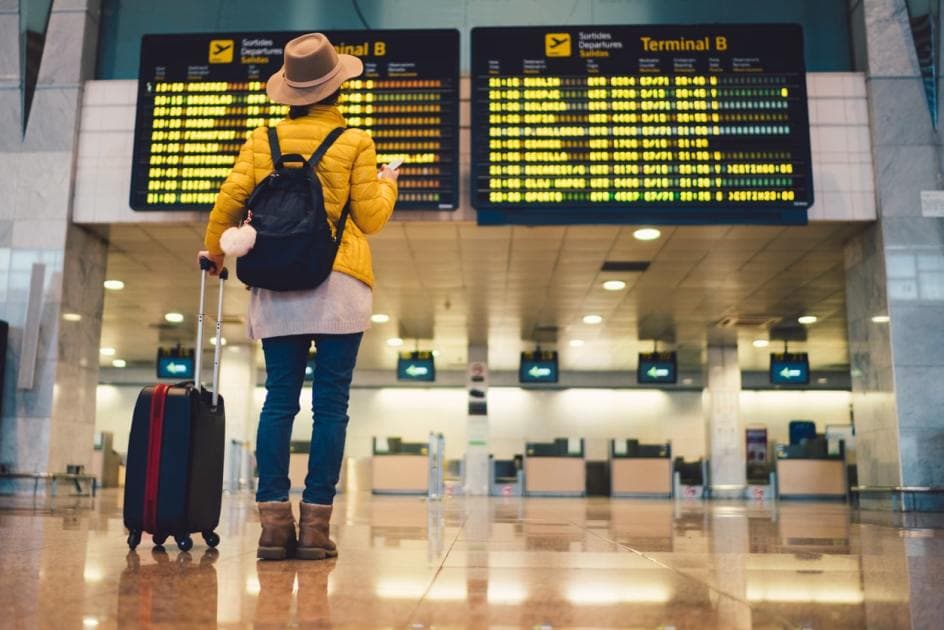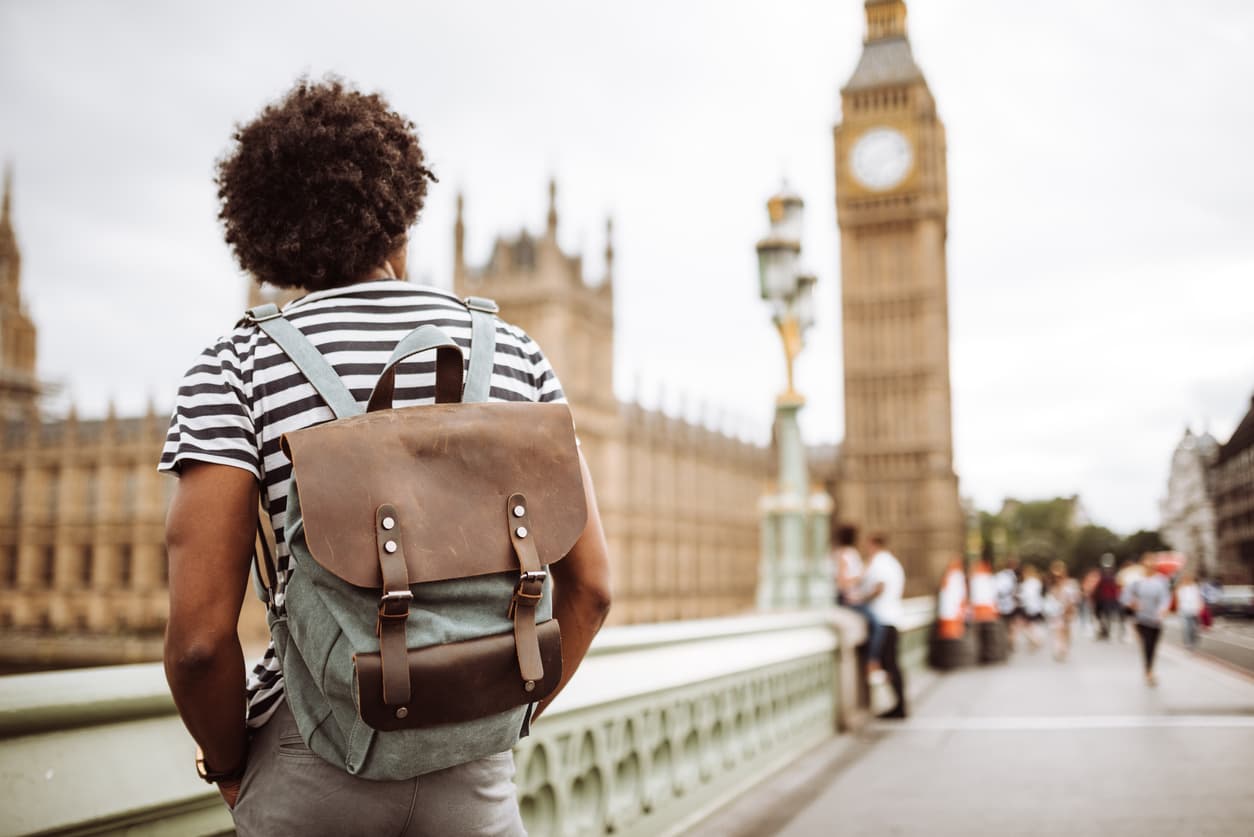- Home
- Blog
- Relocating
- The ultimate moving abroad checklist (handy for expats!)

The ultimate moving abroad checklist (handy for expats!)
Looking forward to settling down permanently overseas? Glance through this moving abroad checklist to see if anything’s slipped your mind.
3 novembre 2020 — 14 min read
Looking forward to settling down permanently overseas? Glance through this moving abroad checklist to see if anything’s slipped your mind.
Relocating to another house across town is itself daunting. Compare that to the idea of migrating to a brand-new country, and we don’t blame you if you’re feeling overwhelmed and not sure of where to begin taking on this task.
We don’t want you to start panicking at the last minute, so we’ve split up the task and put together a clean list of the key steps you need to take on before heading for your new home abroad. Take a peek!
Essential money moves
Important documents checklist
A to-do list for your new home abroad
Health checklist before moving overseas
Relocating your pets abroad
The most basic moving abroad checklist
1. Essential money moves
Download an international money transfer app
After relocating, you may need to move your finances from your bank account at your previous country to the account at a bank at your new town or city. Banks can help you with this work, of course, but you have to contact them, provide them with some details, and then wait for them to initiate the transfer, all within limited bank working hours.
What you need when moving abroad, for transferring money between your bank accounts, is an online money transfer app that can send money to a bank account lickety-split. For example, the Xe app (and website) lets you send money across the globe quickly and cost effectively. You can also use the Xe Currency Converter to calculate live foreign exchange rates for free.
Check your potential living costs after relocating
Living overseas can get quite expensive before you know it. So, before leaving for your new country, figure out the costs of food, housing, transportation, education, healthcare, utilities like electricity, insurance, and entertainment over there.
Find out how the living costs may change, and ensure that you can afford to live the lifestyle abroad that you want to.
Set a budget
Once you’ve calculated what your living costs can sum up to, put together rough estimates of your monthly expenses and income, and get working on a budget you can actually stick to. Take help from the sample monthly or weekly budgets you’ll find for many countries online.
You can also plan your overseas budget using online cost-of-living calculators and expat blogs.
Start job-hunting
If you don’t have a job waiting for you already overseas, it’s high time you started looking for one.
Build a professional CV, set up job alerts on the local job-hunting websites, and create or update your own LinkedIn profile, for starters. Spread the word that you’re looking for work somewhere new - who knows, you might connect with someone looking for the exact skillsets you’ve got!
Understand expat taxes
Some countries, like the US, require expats to file taxes annually, if their gross worldwide income exceeds the filing threshold. Since these issues are too complex, and non-compliance comes with harsh penalties, consult a qualified accountant before making the move abroad.
Get some local currency
Plan ahead! Pick up some of your new country’s currency from your bank in your present country, or send a money transfer to your bank account in your new country so you can withdraw your cash once you’ve arrived.
Trust us, you don’t want to get stuck in the midst of your move looking for a place where you can convert your money to the new country’s currency. Airport currency exchanges don’t offer an impressive exchange rate, either.
Plus, in case your debit or credit card freezes, it’s better to keep some cash with you during the move.
Choose your bank before moving overseas
Research banks in the new country well in advance before leaving.
First of all, find out if the government or a private organization in the new country guarantees the bank deposits. If the government does, do some research on the stability of the government. If a private organization is the guarantor, consider their strength and reputation.
Next, focus on the bank’s international clearing networks and variables like interest rates and fees.
Does that bank have enough branches and ATMs in your new city or town? Is there an international helpline? Also, select a bank that offers personal loans or mortgages to help you with buying a property in your new country.
Open a bank account after relocating
Even if you can’t open a bank account overseas before leaving your present country, you can likely still start the application process and gather all the necessary documents before heading to the destination country.
You may find it difficult to encash a paycheck, find a house, or get a cellphone or credit card without a local bank account.
Some countries also let you open an expat bank account, whether a checking account or a savings one. With these accounts, you can hold money in multiple currencies.
2. Important documents checklist
Get the necessary visas
First of all, start with applying for a visa with the country you’ll be moving to. The visa application process can take as long as 6 months, or even longer, so apply as early as possible.
Before applying, glance over the visa requirements at your new country to know what you need to do for getting a visa. These visa requirements will vary depending on which visa you want to apply for.
Update your passport
It should go without saying that you need to have an official, government-issued passport for moving abroad. If you don’t have one already, apply for it several months before migrating overseas.
In case you’ve got a passport, some countries require you to update it with your new address, while others don’t.
Make sure your passport is valid; if it isn’t, or expiring soon, you should renew it.
Make travel reservations
Whether you want to migrate to the new country by flight or by cruise ship, last-minute tickets can get pricey.
Start examining travel prices as soon as possible, and keep tabs on the prices to know when you might get the best deals on the tickets.
Pick a departure date that’s affordable, and also lets you reach your destination on time.
Prepare for the paperwork
Apart from your passport and visas, you may need some more documents:
Proof of citizenship
Birth certificate
Marriage certificate
Proof of residence
Proof of your new job, if any
Driving license
Insurance policies
Academic records
Employment records
Tax records
Child custody papers, if any
Adoption papers, if any
Living will and testament
Other paperwork, as required
Find out exactly what personal documents you may need before moving overseas, so that you don’t miss out on anything and start fumbling for an essential document in front of the authorities in your new country.
Make copies of all essential documents
When you’ve found out what paperwork you need, arrange them in a neat case in an orderly way, and make 4-5 copies of all of those. So, even if you lose one of these documents, you’ll have a copy of that document handy.
For greater safety, you may want to laminate all the important paperwork to protect them from wear and tear.
3. A to-do list for your new home abroad
Explore housing options in the new country
Try to find out the best housing options to consider, like buying a property or renting one. If you can buy a property at your new location, seek to get a loan or a mortgage.
Get in touch with estate agents and other industry experts who can help you with the costs and any language barriers.
However, renting a house or an apartment just for the 1st month or so may be easier for expats. That’s because you’ll get enough time to take stock of the local housing market in the new country, and find a place that you really like without pressure.
Decide which items you’ll bring along
While deciding which items you’ll carry with you, consider how much space you’ll have at your new residence. If it’s a wee house, or you plan on sharing a small apartment with others, taking 3-4 suitcases with you probably won’t be feasible.
You also have to be choosy about what to carry or to leave behind if you take a flight, as airlines charge a fee for extra luggage.
Sell, store or donate everything else
Once you’ve packed all the items you want to bring along to your new country, it’s time to determine what you should do with the remaining items. Select which of these items you want to sell, store, or give away, and organize those accordingly.
You can sell your old possessions on Amazon, eBay, or Craigslist, and donate the rest of the items to a local thrift shop or to charities.
Sell or rent out your current home
You may have to sell your existing home to finance your move overseas. For this reason, start working with a realtor or list your property on Craigslist and other such websites.
You should begin this process quickly, as selling or renting out your house can take between a month and a year.
Always keep a backup plan, though, lest your house sells faster than you’d expected, or if it doesn’t sell in time.
Set up international mail forwarding
What if your mail piles up on your doorstep at your previous home after you’re done moving your life abroad? It won’t be a pretty sight, of course, and you don’t want to lose out on important mails, do you?
That’s why you should set up international mail forwarding to your new location.
4. Health checklist before moving overseas
Buy medical insurance
One of the essential things to consider before moving abroad is whether you’re financially covered in case of illness or any injury.
You may identify an international health insurance plan that’s tied up with a long list of hospitals, besides guaranteeing emergency assistance round-the-clock.
Explore global health insurance plans online, tailored to fit your unique lifestyle. Secure your health anywhere in the world for you and your family before moving abroad.
Visit your doctor for a checkup
Right before migrating to another country, make sure there aren’t any pressing health matters to take care of. So, you need to visit the doctor for a routine health checkup and ensure you’ve taken all the necessary vaccines and immunizations.
Get the required immunizations
It’s unlikely that you’ll need vaccinations if you’re leaving for a country in northern or central Europe, North America, or Australia, but, well, better safe than sorry!
You’ll usually need to get vaccinated against a number of infectious diseases found overseas, like hepatitis A and typhoid, but that depends on the country you’re moving to.
For example, if you’re migrating to the United Arab Emirates (UAE), you won’t need to get vaccinated against yellow fever. But you will, if you’re moving to Mali (in West Africa).
Stock up on your medications
Do you take regular medications? If so, there’s no better time to store up on these medications than now.
What if you can’t access prescriptions soon after landing in your destination country? You don’t want to run out of these important medicines in unknown surroundings, do you
5. Relocating your pets overseas
Check any pet regulations in the new country
If you’re thinking of pet relocation, enquire about any rules and regulations regarding pets in your destination country. These rules vary, based on the country you’re moving to and your pet (whether it’s a dog, a cat, or any other animal).
Some countries may need you to get tapeworm treatment for your dog, or rabies shots, while others may quarantine your pet for a particular time period.
Can your pet handle the move?
Some pets get too exhausted while travelling, especially on flights. So, take your pet to the vet and take his or her professional opinion on whether or not your pet’s physically healthy enough for travelling overseas.
Get the necessary pet medications
You may find your pet’s medications easily enough in your present country, but what if finding these same medications in your new country isn’t as easy?
Make sure your pet’s covered with enough vaccinations for 1-2 months, until you come across the right vet for your pet abroad.
Pack all the paperwork related to your pets
Don’t forget to bring proper paperwork regarding your pets, or the authorities may detain or quarantine the pets when you land in the new country. Just like you’ve made copies of all your personal documents, get extra copies of all the pet-related documentation as well.
6. The most basic moving abroad checklist
Start learning the local language
You’ve got no worries about language barriers if you’re moving to a country where you know and speak the lingo - but what if you don’t know it?
You ought to know how to communicate basic phrases, such as “Hello”, “Good morning”, “Thank you”, or “Where’s the hospital?” Well, language learning apps like Duolingo and Babbel to the rescue!
You can also take BBC’s free language courses online, or find a local tutor for in-depth learning.
Arrange for your first night at your new destination
Trying to find your bearings in entirely new surroundings while dealing with jetlag isn’t the best feeling. So, you should make arrangements for a place to sleep, at least on your 1st night, so that you don’t get stressed out unnecessarily.
Enquire about the nearest pharmacy or hospital
Preparing for the worst is for the best - the last thing you want is combing your new location abroad for the nearest hospital with a broken arm or when you’re running a fever.
Rather, take a few minutes to explore healthcare facilities near your new residence before leaving your current home, or as soon as you arrive in the new country.
Join a couple of local forums
When you want to swap information about living in the new country, your go-to place is the expat web forum for that country. Simply enter “[country] expat forum” in Google search, and it’ll yield active web forums for expats (if that country has such forums - but most countries do, don’t worry!).
You can also look out for such communities on social media like Facebook.
After arriving at your destination country for the 1st time, you can do with some advice from the members of these forums and communities.
Hire an international moving company
You’ll need professional and high-quality movers who can ship your belongings to your new home undamaged and on time. Research several international moving companies and compare their moving quotes before choosing one.
Learn about your new country’s rules and regulations
You should do your research about how different the laws in your new country are from those in your current country. And in wake of the present coronavirus pandemic, different lockdown restrictions are in place across different countries.
Contact the nearest consulate or embassy to find out any info relevant to expats relocating to the new country.
Turn off all your current utilities
Another important thing on your moving abroad checklist is to turn off all your utilities like water, lights, and heat in your present home. You wouldn’t want to get a utility bill out of nowhere while you’re enjoying your life overseas, would you?
So, make sure to pause or cancel all plans with your current utility company before leaving for your new home abroad.
Find out about any driving requirements in the new country
If you’re thinking of driving around in your new country of residence, enquire about the local driving rules and regulations, especially the driving license requirements.
Keep an International Driving Permit handy, but you may need a local driving license as well, so ask around at an online expat forum or community about what’s necessary as per the new country’s driving customs.
In short…
We know, that feels like a lot to take in. Just remember these steps:
Prepare your finances well in advance.
Find out which documents you’ll need, and collect them.
Look for a new home.
Talk with your doctor and ensure your health is in order.
If you have pets, make sure they can handle the move.
Figure out what you’ll need for your everyday life once you’ve arrived
So, are you ready to take the huge leap overseas? In case you’re feeling nervous about moving money between banks in different countries, sign up or download the Xe app today for effortless international money transfers to take the first step in preparing for your big move.
Related Posts

28 juin 2021 — 7 min read

17 juin 2021 — 8 min read

25 mai 2021 — 9 min read

18 décembre 2020 — 8 min read

5 novembre 2020 — 8 min read

30 octobre 2020 — 8 min read